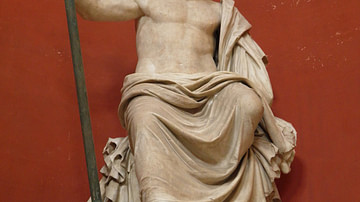Search
Did you mean: Tsar?
Search Results

Article
The Athenian Calendar
The term “Athenian Calendar” (also called the “Attic Calendar”) has become somewhat of a misnomer, since Ancient Athenians never really used just one method to reckon the passage of time. Athenians, especially from the 3rd Century BCE forward...

Definition
Walpurgis Night
Walpurgis Night (30 April, annually) is a modern-day European and Scandinavian festival derived from the merging of the ancient pagan celebration of Beltane with the commemoration of the canonization of the Christian Saint Walpurga (l. c...

Article
The Delian League, Part 4: The Ten Years War (431/0-421/0 BCE)
This text is part of an article series on the Delian League. The fourth phase of the Delian League encompasses the first part of the Great Peloponnesian War, also referred to as the Ten Years War, sometimes called quite incorrectly The Archidamian...

Article
History of Halloween
Halloween is among the oldest traditions in the world as it touches on an essential element of the human condition: the relationship between the living and the dead. The observance evolved from ancient rituals marking the transition from...

Article
Daily Life in Ancient China
Daily life in ancient China changed through the centuries but reflected the values of the presence of gods and one's ancestors in almost every time period. Villages like Banpo show evidence of a matriarchal society, where there was a priestly...

Article
The Batavian Revolt
Batavian revolt was a rebellion of the Batavians against the Romans in 69-70 CE. After initial successes by their commander Julius Civilis, the Batavians were ultimately defeated by the Roman general Quintus Petillius Cerialis. The year...

Definition
Cerdic
Cerdic of Wessex (r. 519-534) was King of the West Saxons and the founder of Wessex. His influence was so profound that later genealogies of the English monarchy would claim that all the sovereigns of Britain, save for Canute, Hardecanute...

Definition
Vespasian
Vespasian was Roman emperor from 69 to 79 CE. Vespasian was the last of the four emperors who governed the Roman Empire in the year 69 CE. The previous three had died either by murder or suicide. Unlike Galba, Otho and Vitellius, Vespasian...

Definition
Galba
Galba was Roman emperor from June 68 to January 69 CE. With the death of Emperor Nero on June 9, 68 CE, the Julio-Claudian dynasty officially ended, leaving the Roman Empire without a clear successor to the throne. With the assistance of...

Definition
Otho
Otho was Roman emperor from January to April 69 CE. Immediately after the assassination of Galba, Otho, the governor of Lusitania, was proclaimed emperor by the army. However, the unrest that existed in the short reign of Galba would spell...